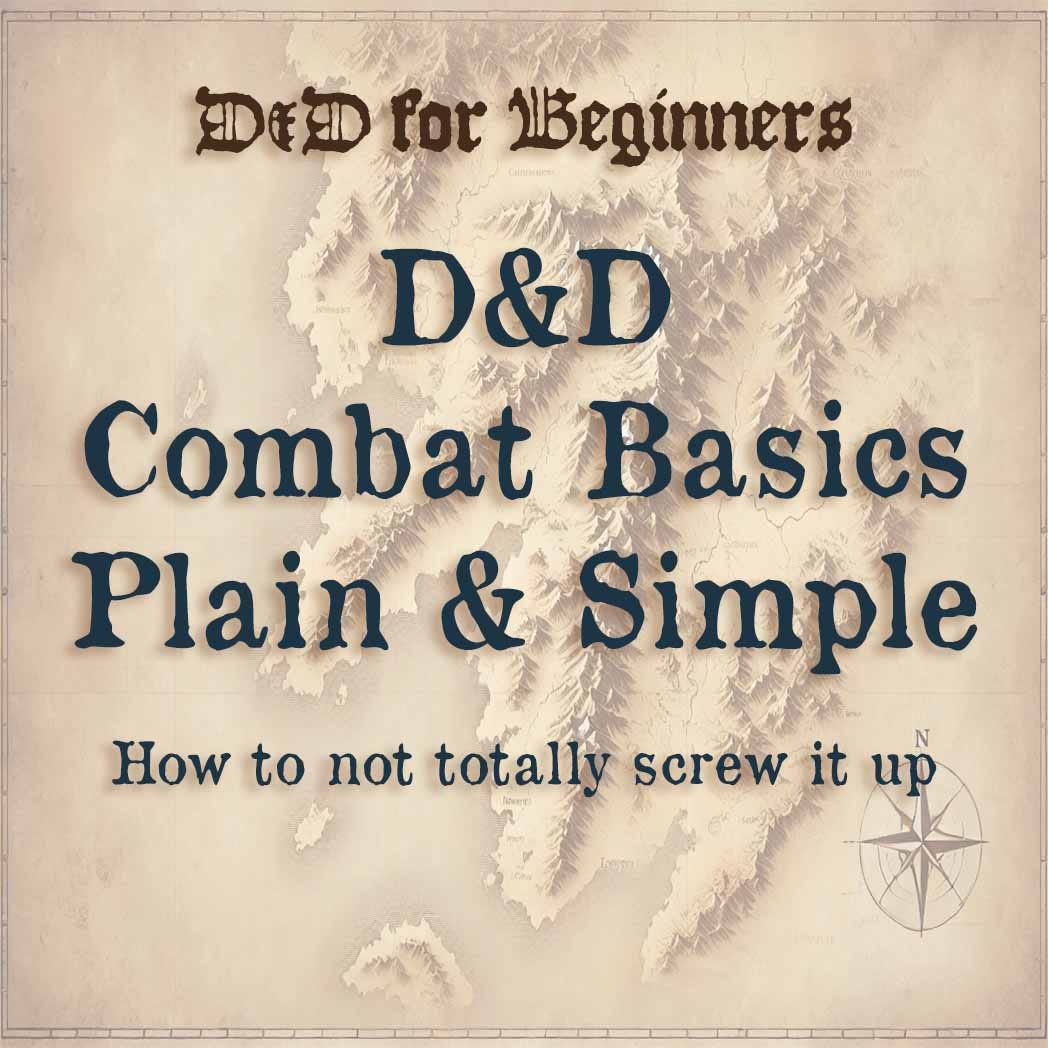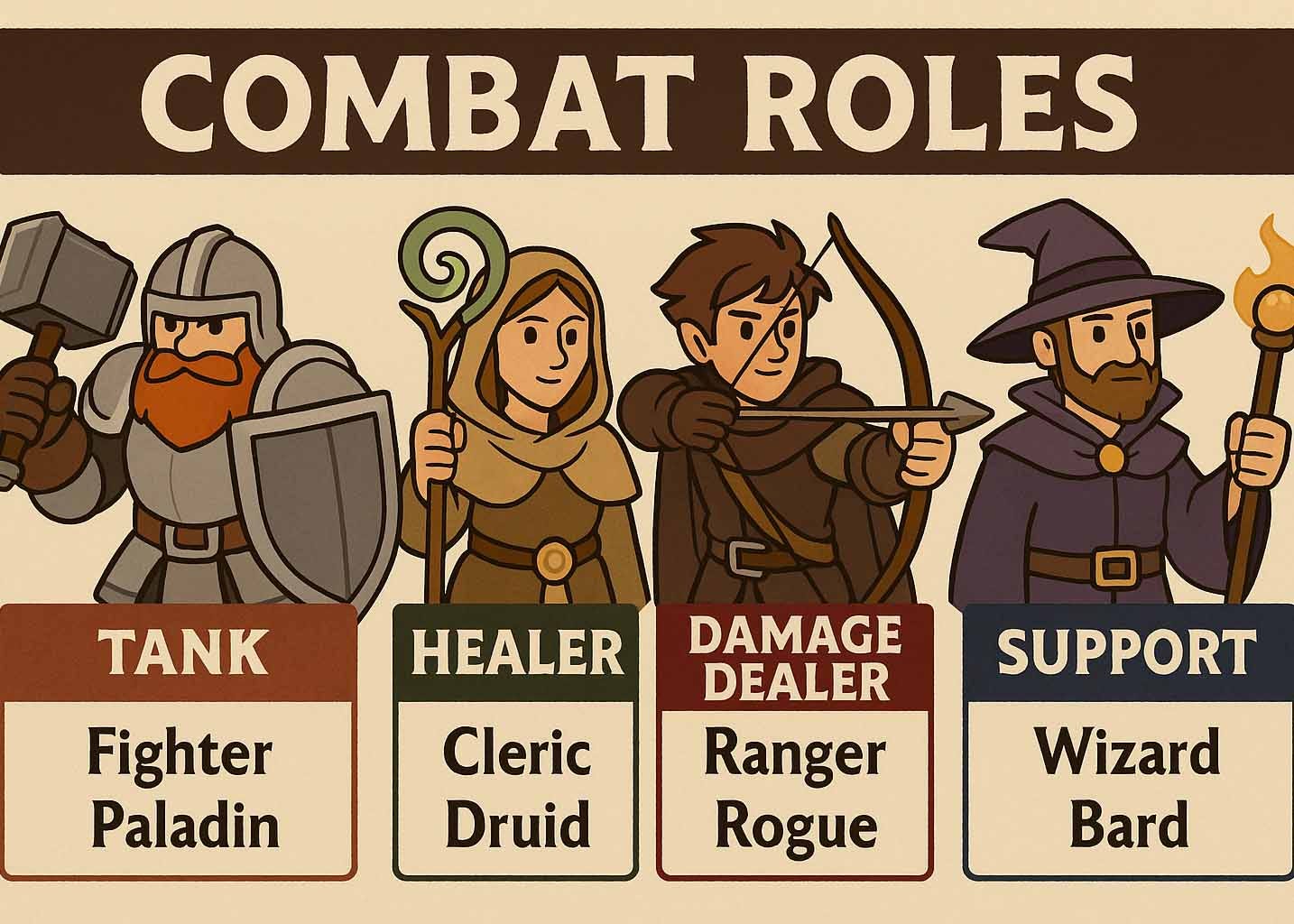D&D Combat Basics, Plain and Simple
Combat doesn’t have to be scary. Here’s how to not totally screw it up.
Dreading Your D&D Combat Debut? Yeah, I was too at first. You're sitting at the table, maybe getting into character a bit, having a blast talking to NPCs and solving puzzles. Then, out of nowhere, the DM says those three pucker-inducing words: "Everyone roll initiative."
Your stomach drops. Your palms get sweaty. Your eyes frantically flit around your character sheet, wondering what the hell you're supposed to do.
Here's what to do.
Turn versus Round. This is up here at the top, looking awkwardly out of place, because I mention turns and rounds a few times in the paragraphs below. We take turns in D&D, so a "turn" is when someone is in the spotlight. A "round" is a complete cycle through all the players' and the DM's turns.
Rolling for Initiative
First things first: initiative. Initiative simply means the turn order for both the players and the bad guys. Roll a d20 and add your Dexterity modifier. That's it. Higher numbers go first.
When I started, I'd always forget my modifier and have to ask the table like five times. Now I just circle it on my character sheet. Problem solved.
The "d20 + DEX modifier" method is the rules-as-written (RAW) way to determine turn order, but there are dozens of other ways for the DM to use, depending on several factors that aren't "need to know" right now.
Speaking of initiative, it occurs to me that now
would be an excellent time to SHARE D&D for Beginners!
Before the Chaos Begins
Trust me on this: prep your character sheet before combat starts.
Circle these things on your character sheet:
Your attack bonuses and weapon damage
If you're a spellcaster, your spell attack bonus and your spell save difficulty class (DC)
Your armor class (AC)
Your hit points (HP)
Any special combat abilities you might have due to your race/species or your class
The Six-Second Rule (Yes, Really.)
This takes a bit to wrap your head around. No matter how long it takes in at-the-table time, each round of combat represents only about six seconds of in-game time. Everyone's essentially acting at once during the same six seconds - we just take turns for sanity's sake.
So keeping in mind that everything you do on your turn at the table takes only six seconds for your character, on your turn, you get to:
Move a number of feet equal to what in in the Speed box on your character sheet (usually 30)
Do something intentional (attack, cast a spell, dodge around like crazy)
Take a bonus action if your class gets one
Do free minor stuff like drawing a weapon or yelling something to your teammate.
Plus you get one reaction per round — it resets at the beginning of each of your turns — to use in response to some specific trigger, allowing you to act when it's not your turn. For example, if a bad guy turns his back to you and tries to run away, you can take a swing as a reaction. As another example, if you're a squishy wizard, you may have a reaction that allows you to pop off a spell that boosts your AC when you get attacked. Think of reactions as your "Oh, shit!" button.
Your Turn. Don't Panic.
When it's your turn, take a breath. Here's what I suggest:
Look around. Who's trying to kill me? Who needs help? Is there a convenient cliff I can push someone off of?
Move if you need to. You can split your movement. If your speed is 30, you can move 10 feet, attack, then move the other 20. It's totally legal.
Pick your main action. Usually this means attacking something, but sometimes it's smarter to dodge, help a friend, or hide behind a rock.
Use your bonus action if you have one. Not everyone does, and that's fine.
Say something quick. Like "Duck!" or "Behind you!" Save the epic speeches for when you're not getting stabbed.
Attacking Without Screwing Up
Making an attack is simpler than it looks:
Roll a d20, add your modifiers, try to meet or beat the enemy's AC. That's it.
For melee attacks: d20 + Strength + proficiency bonus (if you're good with that weapon)
For ranged attacks: d20 + Dexterity + proficiency bonus
Did you hit? Roll damage.
Miss? Narrate how you dramatically whiffed.
If you roll a "natural 20," or "crit" for critical success, which is a 20 on the die, you automatically hit AND you get to roll damage dice twice. But, there's a saying that "the dice giveth, and the dice taketh away." If you roll a 1 on the die, a "crit fail," you automatically miss AND do so in an especially spectacular fashion..
As with initiative, there are many ways to handle crits. Different groups of players may have different ways of handling them. Don't worry; they'll let you know what to do after they're done cheering for your hit... or laughing at the miss.
Spells Aren't as Scary as They Look
Okay, well, maybe they’re a little scary for the first few sessions. There are so many. How do you remember them all? How do you know how many more you can cast?
Well, you don't remember them all. Pick 2-3 spells you understand and use those until you're comfortable. I cast Magic Missile for like four sessions straight because it always hits and the math is simple.
Some spells use your action, some use your bonus action. A big rule: If you cast a bonus action spell, you can only cast a cantrip as your main action for that turn. That rule seems to confuse everyone.
Also, you can only keep one spell labeled as "concentration" active at a time. And if you get hit hard enough, there's a chance it'll break your concentration and end the spell.
Moving Around Without Dying
First time I played, I went toe-to-toe with a pair of orcs and got friggin' wrecked. Turns out positioning matters.
Here's what I've learned:
Rough terrain cuts your movement in half.
If you walk away from someone in melee, they get to hit you for free as an "opportunity attack." I mean, you didn't really think only the good guys get to use reactions, did you?
Use the environment to partially hide behind stuff, like boulders or overturned tables. It makes you harder to hit.
Different classes stand in different places. Tanks up front, squishy wizards in back.
Your Combat Action Menu
When you're paralyzed with indecision, here are your main options:
Attack: Hit or shoot things with whatever you're holding.
Dodge: Everyone attacks you with disadvantage.
Disengage: Move away without triggering an opportunity attack reaction.
Dash: Move twice as far as usual.
Help: Distract an enemy, giving a teammate advantage on their next attack.
Ready: Wait for something specific to happen, then do something.
Hide: Find cover and hope no one spots you.
Teamwork Makes the Dream Work
Teamwork is the secret sauce. Talk to your team. Not lengthy tactical planning sessions, but quick, clear communication. Remember, everything everyone is doing during the round is happening in only six seconds.
So "I'll tank the big guy, you get the archers!" "Heal the fighter!" "Flank it!"
Related to teamwork: "focused fire," everyone attacking the same target, works WAY better than spreading damage around.
When Things Go Horribly Wrong
Sometimes you drop to 0 hit points. Don't panic. You're not dead yet.
You fall unconscious and start making death saving throws. Roll a d20:
10 or higher? Success.
Under 10? Failure.
Three successes? You're stable but still unconscious.
Three failures? Okay, so now you're really dead.
If someone heals you, you're back in action. This is where those teamwork skills come in handy.
The Real Secret
Combat gets easier every single time you do it. Those first few sessions where you're fumbling with dice and asking "Wait, what can I do again?" fade away quickly.
D&D combat, just like D&D overall, isn't about being perfect. It's about telling a great story with your friends. Some of my best D&D memories come from combat decisions that were tactically terrible but narratively awesome.
So next time combat starts, take a breath, roll some dice, and remember that everyone at the table wants you to succeed. Even if you mess up, even if you forget a rule, even if you accidentally cast a spell on yourself instead of the enemy (been there, done that), you're still part of that great story.






I’m not a beginner but this was really helpful! Some things you’re just “expected” to know but never quite understand …